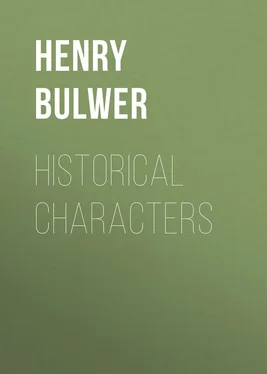Henry Bulwer - Historical Characters
Здесь есть возможность читать онлайн «Henry Bulwer - Historical Characters» — ознакомительный отрывок электронной книги совершенно бесплатно, а после прочтения отрывка купить полную версию. В некоторых случаях можно слушать аудио, скачать через торрент в формате fb2 и присутствует краткое содержание. Жанр: foreign_antique, foreign_prose, на английском языке. Описание произведения, (предисловие) а так же отзывы посетителей доступны на портале библиотеки ЛибКат.
- Название:Historical Characters
- Автор:
- Жанр:
- Год:неизвестен
- ISBN:нет данных
- Рейтинг книги:3 / 5. Голосов: 1
-
Избранное:Добавить в избранное
- Отзывы:
-
Ваша оценка:
- 60
- 1
- 2
- 3
- 4
- 5
Historical Characters: краткое содержание, описание и аннотация
Предлагаем к чтению аннотацию, описание, краткое содержание или предисловие (зависит от того, что написал сам автор книги «Historical Characters»). Если вы не нашли необходимую информацию о книге — напишите в комментариях, мы постараемся отыскать её.
Historical Characters — читать онлайн ознакомительный отрывок
Ниже представлен текст книги, разбитый по страницам. Система сохранения места последней прочитанной страницы, позволяет с удобством читать онлайн бесплатно книгу «Historical Characters», без необходимости каждый раз заново искать на чём Вы остановились. Поставьте закладку, и сможете в любой момент перейти на страницу, на которой закончили чтение.
Интервал:
Закладка:
“Philarète,” says M. Laclos, “having found it easy to become a hero, fancies it will be as easy to become a statesman. The misfortune of Philarète is that he has great pretensions and ordinary conceptions. He has persuaded himself that he was the author of the revolution in America; he is arranging himself so as to become one of the principal actors in a revolution in France.
“He mistakes notoriety for glory, an event for a success, a sword for a monument, a compliment for immortality. He does not like the court, because he is not at his ease in it; nor the world, because there he is confounded with the many; nor women, because they injure the reputation of a man, while they do not add to his position. But he is fond of clubs, because he there picks up the ideas of others; of strangers, because they only examine a foreigner superficially; of mediocrity, because it listens and admires.
“Philarète will be faithful to whatever party he adopts, without being able to assign, even to himself, any good reasons for being so. He has no very accurate ideas of constitutional authority, but the word ‘liberty’ has a charm for him, because it rouses an ambition which he scarcely knows what to do with. Such is Philarète. He merits attention, because, after all, he is better than most of his rivals. That the world has been more favourable to him than he deserves, is owing to the fact that he has done a great deal in it, considering the poverty of his ability; and people have been grateful to him, rather on account of what he seemed desirous to be, than on account of what he was. Besides, his exterior is modest, and only a few know that the heart of the man is not mirrored on the surface.
“He will never be much more than we see him, for he has little genius, little nerve, little voice, little art, and is greedy of small successes.”
Such was the portrait which was drawn of Lafayette; we now come to that of M. de Talleyrand.
“Amène has charming manners, which embellish virtue. His first title to success is a sound understanding. Judging men with indulgence, events with calmness, he has in all things that moderation which is the characteristic of true philosophy.
“There is a degree of perfection which the intelligence can comprehend rather than realise, and which there is, undoubtedly, a certain degree of greatness in endeavouring to attain; but such brilliant efforts, though they give momentary fame to those who make them, are never of any real utility. Common sense disdains glitter and noise, and, measuring the bounds of human capacity, has not the wild hope of extending them beyond what experience has proved their just limit.
“Amène has no idea of making a great reputation in a day: such reputations, made too quickly, soon begin to decline, and are followed by envy, disappointment, and sorrow. But Amène will arrive at everything , because he will always profit by those occasions which present themselves to such as do not attempt to ravish Fortune. Each step will be marked by the development of some talent, and thus he will at last acquire that general high opinion which summons a statesman to every great post that is vacant. Envy, which will always deny something to a person generally praised, will reply to what we have said, that Amène has not that force and energy of character which is necessary to break through the obstacles that impede the course of a public man. It is true he will yield to circumstances , to reason, and will deem that he can make sacrifices to peace without descending from principle ; but firmness and constancy may exist without violent ardour, or vapid enthusiasm.
“Amène has against him his pleasing countenance and seductive manner. I know people whom these advantages displease, and who are also prejudiced against a man who happens to unite the useful chance of birth with the essential qualities of the mind.
“But what are we really to expect from Amène in the States-General? Nothing, if he is inspired with the spirit of class; much, if he acts after his own conceptions, and remembers that a national assembly only contains citizens.”
Few who read the above sketch will deny to the author of the “ Liaisons Dangereuses ” the merit of discernment. Indeed, to describe M. de Talleyrand at this time seems to have been more appropriate to the pen of the novelist than to that of the historian. Let us picture to ourselves a man of about thirty-five, and appearing somewhat older: his countenance of a long oval; his eyes blue, with an expression at once deep and variable; his lips usually impressed with a smile, which was that of mockery, but not of ill-nature; his nose slightly turned up, but delicate, and remarkable for a constant play in the clearly chiseled nostrils. “He dressed,” says one of his many biographers, “like a coxcomb, he thought like a deist, he preached like a saint.” At once active and irregular, he found time for everything: the church, the court, the opera. In bed one day from indolence or debauch, up the whole of the following night to prepare a memoir or a speech. Gentle with the humble, haughty with the high; not very exact in paying his debts, but very scrupulous with respect to giving and breaking promises to pay them.
A droll story is related with respect to this last peculiarity. The new Bishop had ordered and received a very handsome carriage, becoming his recent ecclesiastical elevation. He had not, however, settled the coachmaker’s “small account.” After long waiting and frequent letters, the civil but impatient tradesman determined upon presenting himself every day at the Bishop of Autun’s door, at the same time as his equipage.
For several days, M. de Talleyrand saw, without recognising, a well-dressed individual, with his hat in his hand, and bowing very low as he mounted the steps of his coach. “ Et qui êtes vous, mon ami? ” he said at last. “ Je suis votre carrossier, Monseigneur. ” “ Ah! vous êtes mon carrossier; et que voulez-vous, mon carrossier? ” “ Je veux être payé, Monseigneur ,” said the coachmaker, humbly. “ Ah! vous êtes mon carrossier, et vous voulez être payé; vous serez payé, mon carrossier. ” “ Et quand, Monseigneur? ” 7 7 “And who are you, my friend?” “I am your coachmaker, my lord.” “Ah! you are my coachmaker; and what do you want, my coachmaker?” “I want to be paid, my lord.” “Ah! you are my coachmaker, and you want to be paid; you shall be paid, my coachmaker.” “And when, my lord?” “You are very inquisitive!”
“Hum!” murmured the Bishop, looking at his coachmaker very attentively, and at the same time settling himself in his new carriage: “ Vous êtes bien curieux! ” Such was the Talleyrand of 1789, embodying in himself the ability and the frivolity, the ideas and the habits of a large portion of his class. At once the associate of the Abbé Sieyès, and of Mademoiselle Guimard: a profligate fine gentleman, a deep and wary thinker; and, above all things, the delight and ornament of that gay and graceful society, which, crowned with flowers, was about to be the first victim to its own philosophy. As yet, however, the sky, though troubled, gave no evidence of storm; and never, perhaps, did a great assembly meet with less gloomy anticipations than that which in the pomp and gallantry of feudal show, swept, on the 1st of May, through the royal city of Versailles.
Still, there was even at that moment visible the sign and symbol of the approaching crisis; for dark behind the waving plumes and violet robes of the great dignitaries of Church and State, moved on the black mass, in sable cloak and garb, of the Commons, or tiers-état, the body which had, as yet, been nothing , but which had just been told by one of its most illustrious members, 8 8 Sieyès, in a celebrated pamphlet published at this period.
that it ought to be everything .
Интервал:
Закладка:
Похожие книги на «Historical Characters»
Представляем Вашему вниманию похожие книги на «Historical Characters» списком для выбора. Мы отобрали схожую по названию и смыслу литературу в надежде предоставить читателям больше вариантов отыскать новые, интересные, ещё непрочитанные произведения.
Обсуждение, отзывы о книге «Historical Characters» и просто собственные мнения читателей. Оставьте ваши комментарии, напишите, что Вы думаете о произведении, его смысле или главных героях. Укажите что конкретно понравилось, а что нет, и почему Вы так считаете.












